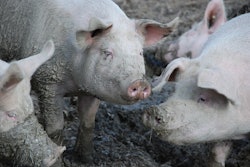Fall Armyworm Spreads To All 19 Chinese Provinces
China's Agriculture Ministry has identified that the fall armyworm in 19 provinces or approximately 333,000 hectares of crops.
The Agricultural Ministry first made public the armyworm threat in April of this year. The pest has been discovered in China’s corn, sorghum and sugarcane crops.
Armyworm has spread rapidly throughout China and is threatening the country’s corn crop.
After the U.S., China is the world’s second largest producer of corn and is generally self-sufficient with respect to the country’s corn demand.
China's Ministry of Agriculture and Rural Affairs has set up monitoring points in key provinces, while local agriculture departments are working with farmers to help select the optimal pesticides to help suppress the threat.
What It Means for the U.S. Farmer: At FBN we believe that the spread of fall armyworm is a net negative for the Chinese corn production but could be a positive for the U.S. corn export program. Despite China’s declining hog and feed demand due to African swine fever (ASF), we believe that China’s aggregate demand construct is approaching an inflection point where demand will outweigh supplies. Whether China comes to the U.S. for corn imports is a question that remains to be seen.
Presidents Trump and Xi To Meet on Saturday To Discuss Trade
President Trump and Chinese President Xi are scheduled to meet this Saturday at the G-20 meeting in Osaka, Japan to help kick-start what has become a contentious and protracted trade war between the two countries.
This will be the first time that the two leaders have met since the December G-20 meeting in Buenos Aires, Argentina.
Trump has threatened to impose tariffs on another $325 billion of goods which will cover nearly all of the remaining Chinese imports into the United States including consumer products such as cell phones, computers and clothing, if the meeting with Xi produces no progress in resolving a host of U.S. complaints around the way China conducts business.
The United States is unwilling to make any new concessions.
China has shown no softening in its position and believes that both sides should make compromises.
Trump advisers have said no trade deal is expected at the meeting but they hope to create a path forward for talks.
What It Means for the U.S. Farmer: At FBN we believe that the continuing trade war between the two counties has been a negative for U.S. agricultural producers. We also believe that China’s non-science based import bans of U.S. corn, DDGS, sorghum and pork has been detrimental to the U.S. producers. While the stalemate between the two countries persists, at FBN we will remain diligent and provide any details from these talks as they pertain to U.S. agriculture.
The risk of trading futures, hedging, and speculating can be substantial. FBN BR LLC (NFA ID: 0508695)










